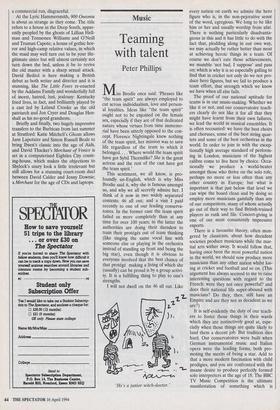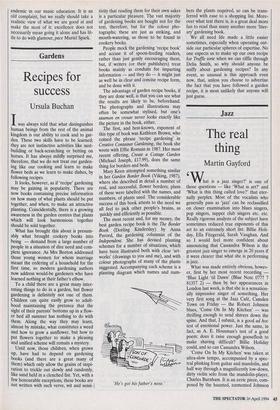Music
Teaming with talent
Peter Phillips
M iss Brodie once said: 'Phrases like "the team spirit" are always employed to cut across individualism, love and person- al loyalties. Ideas like "the team spirit" ought not to be enjoined on the female sex, especially if they are of that dedicated nature whose virtues from time immemo- rial have been utterly opposed to the con- cept. Florence Nightingale knew nothing of the team spirit, her mission was to save life regardless of the team to which it belonged.... Where would the team spirit have got Sybil Thorndike? She is the great actress and the rest of the cast have got the team spirit.'
This sentiment, we all know, is pro- foundly un-English, which is why Miss Brodie said it, why she is famous amongst us, and why we all secretly admire her. I think of it now in two widely separated contexts: 46 all out; and a visit I paid recently to one of our leading conserva- toires. In the former case the team spirit failed us more completely than at any time for over 100 years; in the latter the authorities are doing their damdest to train their proteges out of team thinking (like singing the same vocal line with someone else or playing in the orchestra instead of standing up front and being the big star), even though it is obvious to everyone involved that the best chance of that protégé making a living of which she (usually) can be proud is by a group activi- ty. It is a fulfilling thing to play to one's strengths.
I will not dwell on the 46 all out. Like 'He's a junior witch-doctor.' every nation on earth we admire the hero figure who is, in the non-pejorative sense of the word, egregious. We long to be like him or her and usually worship from afar, There is nothing particularly disadvanta- geous in this and it has little to do with the fact that, plodding along in our own way, we may actually be rather better than most at achieving heroic things in a team. Of course we don't rate those achievements, we mumble 'not bad, I suppose' and pass on; which is why it is so especially galling to find that in cricket not only do we not pro- duce hero figures, but we fail to produce a team effort, that strength which we know we have when all else fails.
The proof of our national aptitude for teams is in our music-making. Whether we like it or not, and our conservatoire teach- ers clearly do not like it for all that they might have learnt from their own failures, we lead the world in musical ensembles. It is often recounted: we have the best choirs and choruses, some of the best string quar- tets and some of the best orchestras in the world. In order to join in with the excep- tionally high average standard of perform- ing in London, musicians of the highest calibre come to live here by choice. Occa- sionally we produce a world-beater amongst those who thrive on the solo role, perhaps no more or less often than any other country in Europe; but what is important is that just below that level we can wipe the board clean and by doing so employ more musicians gainfully than any of our competitors, many of whom actually go out of their way to find British-trained players as rank and file. Concert-giving is one of our most consistently impressive exports.
There is a favourite theory, often mon- gered by classicists, about how decadent societies produce musicians while the mar- tial arts wither away. It would follow that, having once been the most powerful nation in the world, we should now produce more musicians than any other nation whilst los- ing at cricket and football and so on. (This argument has always seemed to me to raise interesting questions with regard to the French: were they not once powerful? and does their national life super-abound with musicians? Do they, then, still have an Empire and are they not as decadent as we are?) It is self-evidently the duty of our teach- ers to foster those things in their wards which they are instinctively good at, espe- cially when those things are quite likely to land them a decent job. But tradition dies hard. Our conservatoires were built when German instrumental music and Italian opera were the leading forms, both pro- moting the merits of being a star. Add to that a more modern fascination with child prodigies, and you are confronted with the insane desire to produce perfectly formed solo interpreters at the age of 18. The BBC TV Music Competition is the ultimate manifestation of something which is endemic in our music education. It is an old complaint, but we really should take a realistic view of what we are good at and make the most of it: excellence does not necessarily mean going it alone and has lit- tle to do with glamour, pace Muriel Spark.



























































 Previous page
Previous page